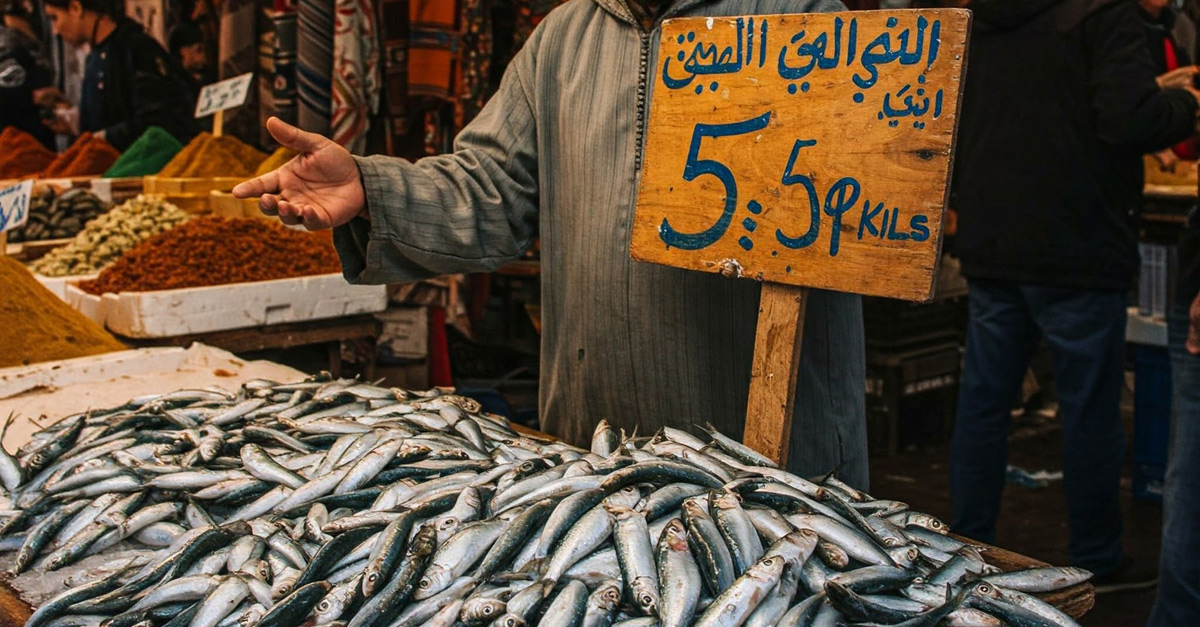The image of a bustling Marrakech fish stall, with sardines piled high and sold for a mere 5 dirhams per kilo, has ignited a fervent debate across Morocco. This seemingly simple act by a local fishmonger, just ahead of Ramadan, has exposed the complex dynamics of the nation’s seafood industry, raising crucial questions about affordability, the role of middlemen, and the feasibility of sustainable pricing.
The Cultural and Economic Significance of Sardines in Morocco
Sardines hold a significant place in Moroccan cuisine and culture, especially during Ramadan, when they are a common feature on Iftar tables. Their accessibility has traditionally positioned them as a crucial protein source for lower-income families. However, fluctuating prices, often attributed to the involvement of intermediaries, have made this staple increasingly precarious.
Challenging the Status Quo
The Marrakech fishmonger’s bold move has directly challenged the prevailing narrative of inflated sardine prices. By bypassing the usual channels and selling directly to consumers at a drastically reduced rate, he demonstrated that a more affordable model is potentially viable. This action has resonated deeply with consumers struggling with rising living costs, prompting widespread praise and calls for greater transparency in the seafood supply chain.
However, the 5-dirham sardine has also drawn skepticism and criticism from wholesalers and industry professionals. They argue that such a low price is unsustainable, potentially leading to losses for fishermen and other stakeholders. Concerns center on the costs associated with fishing, transportation, storage, and market fees, which they claim make such a price point unrealistic.
The Middleman’s Grip: Addressing Price Inflation and Official Concerns
The core of the issue lies in the influence of middlemen, whose role in the distribution chain has been a subject of persistent complaints. These intermediaries, often operating between fishermen and retailers, are accused of inflating prices through multiple layers of markups. Consumers and some industry observers argue that streamlining the distribution process by reducing the number of intermediaries could significantly lower prices and ensure fairer returns for fishermen.
Official sources within Morocco have acknowledged the challenges posed by middlemen. The National Office of Fisheries (ONP), responsible for regulating the fishing sector, has faced numerous complaints regarding price manipulation and unfair practices. Reports from the ONP and the Ministry of Agriculture, Maritime Fisheries, Rural Development and Forests have highlighted the need for improved market transparency and better enforcement of regulations to protect both consumers and fishermen.
For example, reports published by the Economic, Social and Environmental Council (CESE) have repeatedly pointed to the issue of intermediaries and the lack of price transparency in the food distribution sector, including fish. CESE reports have called for a more efficient and equitable system, with better traceability and price monitoring. Furthermore, consumer protection associations in Morocco have frequently filed complaints with the relevant authorities, citing instances of price gouging and unfair competition.
The ONP has attempted to address these issues by implementing measures to improve market information and promote direct sales from fishermen to retailers. However, the complexity of the distribution chain and the entrenched practices of some intermediaries have made it difficult to achieve significant change.
Catalyzing Debate and Questioning Long-Term Feasibility
The Marrakech fishmonger’s act has served as a powerful catalyst for a renewed discussion about these systemic problems. It has highlighted the potential for alternative models, where direct sales and reduced intermediation could benefit both consumers and fishermen. However, the long-term sustainability of such models remains a critical question.
Professionals in the sector argue that the 5-dirham price point may not account for all the costs involved, including the risks associated with fluctuating catches and market demand. They emphasize the need for a balanced approach that ensures fair returns for all stakeholders while maintaining affordable prices for consumers.
Now what?
The debate underscores the need for a comprehensive reform of the seafood distribution system in Morocco. This reform should focus on:
- Increased Transparency: Implementing better price monitoring and traceability systems to ensure fair pricing and prevent price manipulation.
- Reduced Intermediation: Promoting direct sales from fishermen to retailers and exploring alternative distribution models to reduce the number of intermediaries.
- Strengthened Regulation: Enhancing enforcement of regulations to protect both consumers and fishermen from unfair practices.
- Support for Fishermen: Providing financial and technical support to fishermen to improve their efficiency and reduce their reliance on intermediaries.
- Consumer Education: Raising awareness among consumers about market dynamics and promoting responsible purchasing practices.
The 5-dirham sardine has become more than just a price point; it has become a symbol of the struggle for affordability and fairness in Morocco’s food market. As the debate continues, it is clear that addressing the challenges posed by middlemen and ensuring sustainable pricing will require a concerted effort from all stakeholders, including government agencies, industry professionals, and consumers. The challenge is to find a balance between affordable prices for consumers and fair returns for the people who work to bring the fish to the market.
Sources and related content
Local fish merchant slashes prices revealing the price gouging of middlemen – TelQuel
Key Findings from Reputable Sources:
- Economic, Social and Environmental Council (CESE):
- The CESE has repeatedly highlighted the “dysfunctioning role of the marketing channels” and the “unregulated role of middlemen” in driving up food prices.
- They emphasize that these intermediaries engage in “speculative practices” that contribute to price spikes.
- The CESE has called for government regulation of these middlemen and for increased transparency in the food market.
- Food and Agriculture Organization of the United Nations (FAO):
- The FAO acknowledges the inefficiencies within Morocco’s food distribution systems, including the role of “unnecessary yet compulsory middlemen.”
- They point to the inadequacy of wholesale facilities as a contributing factor to food losses, hygiene problems, and impediments to an efficient food marketing system.
- The FAO is also involved in projects aimed at modernizing Morocco’s urban agrifood logistics, including the development of new wholesale markets.


